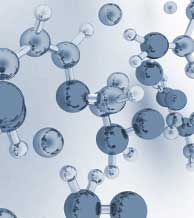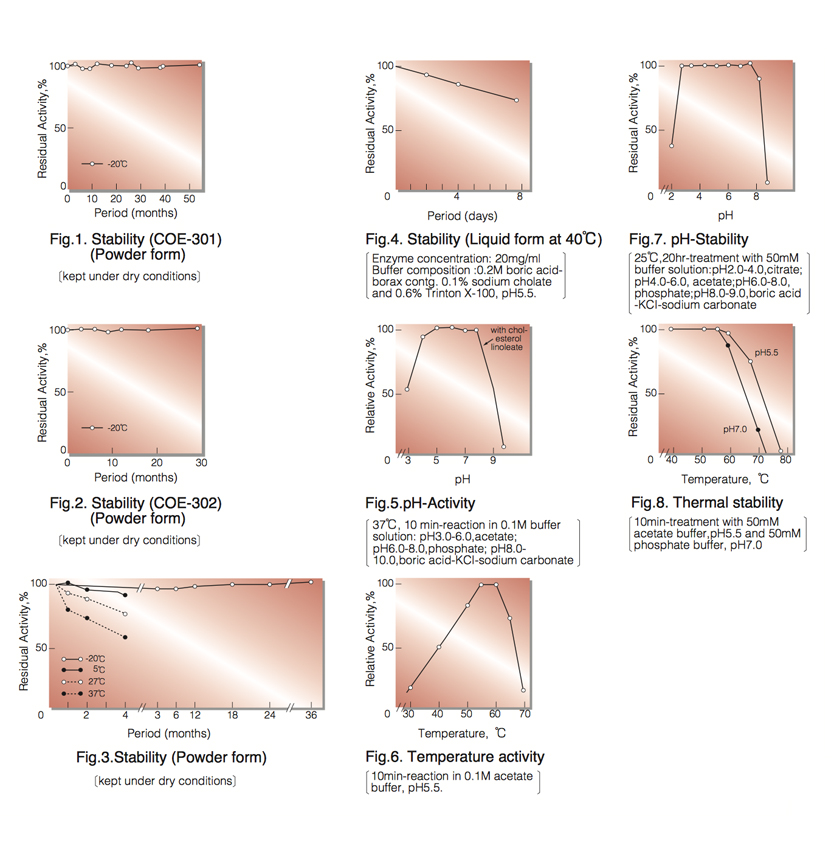CHOLESTEROL ESTERASE from Schizophyllum commune
COE-301, 302
Steryl-ester acylhydrolase (EC 3.1.1.13)

| Appearance: | Light brown amorphous powder, lyophilized | |
|---|---|---|
| Activity: | GradeIII 2.0 U/mg-solid or more (containing approx. 20% of stabilizers) |
|
| Stabilizer: | Na-Cholate | |
| Stability: | Stable at -20°C for at least One year (Fig.1,2) |
|---|---|
| Molecular weight: | approx. 130,000 |
| Isoelectric point: | 4.1±0.1 |
| Michaelis constants: | 3.9×10⁻⁵M (Linoleate), 9.2×10⁻⁵M (Palmitate), 6.3×10⁻⁵M (Decylate), 8.8×10⁻⁵M (Propionate) |
| Inhibitors: | Heavy metal ions (Hg⁺⁺, Ag⁺, Fe⁺⁺⁺) |
| Optimum pH: | 4.8-8.0 (Cholesterol linoleate), 5.0 (serum)(Fig.5) |
| Optimum temperature: | 55-60℃(Fig.6) |
| pH Stability: | pH 2.5-7.5 (25℃, 20hr)(Fig.7) |
| Thermal stability: | below 55℃ (pH 5.5, 10min)(Fig.8) |
| Substrate specificity: | (Table 1) |
APPLICATIONS
This enzyme is useful for enzymatic determination of total cholesterol when coupled with cholesterol oxidase (COO-311, COO-321,COO-331) in clinical analysis.
ASSAY
Principle:
cholesterol esterase
Cholesterol ester ►Cholesterol+Fatty acid
cholesterol oxidase (COD)
Cholesterol ►Cholest-4-en-3-one+H₂O₂
The appearance of indamine is measured at 590nm by spectrophotometry.
Unit definition:
One unit causes the hydrolysis of one micromole of cholesterol ester per minute under the conditions described below.
Method:
| A.COD-POD solution: | 14.4g Na₂HPO₄・12H₂O, 31g boric acid, 15,000 U COD (GradeIII), 25,000 PU POD, 290mg sodium cholate/1,000ml of H₂O (adjusting the pH to 6.5) (stable for a month if stored at 0-5℃) |
|---|---|
| B. DMA-MBTH solution: | 400mg EDTA-Na₂, 0.7ml DMA, 150mg MBTH/1,000ml of 0.5M acetate buffer, pH 4.7 (stable for a week if stored at 0-5℃ in a brownish bottle) |
| C. Cholesterol linoleate solution: | 0.6mM [Dissolve 40mg of cholesterol linoleate in 8.0ml of absolute ethanol on a hot plate, mix 90ml of 1.0% (V/V) of Triton X-100 solution, keep at 70℃ in a hot water bath for 15 minutes and, after cooling down to room temperature in running water, fill up to 100ml with 1.0% (V/V) Triton X-100 (Should be prepared fresh)] |
| D. HCl solution: | 1.0 N |
| E. Enzyme diluent: | 10mM Phosphate buffer, pH 7.0. |
Procedure
1. Prepare the following reaction mixture in a test tube and equilibrate at 37℃ for about 5 minutes.
1.0ml COD-POD solution(A)
1.0ml DMA-MBTH solution (B)
0.1ml enzyme solution*
2. Add 1.0ml of the substrate solution (C) and mix.
3. After exactly 10 minutes at 37°C, add 1.0ml of HCl solution (D) to stop the reaction and measure the optical
density at 590 nm against water (OD test).
At the same time, prepare the blank by first mixing the reaction mixture (1.0ml of substrate solution is used instead of the enzyme solution) with 1.0ml of HCl solution (D) after 10 min-incubation at 37°C, followed by the
addition of the enzyme of the enzyme solution (OD blank).
* Dissolve the enzyme preparation in ice-cold enzyme diluent and dilute to 0.02~0.05U/ml with the same buffer.
Calculation
Activity can be calculated by using the following formula :

ΔOD (ΔOD test−ΔOD blank ) × Vt × df
Volume activity (U/ml) = =ΔOD × 0.105×df
39.0× t ×Vs
Weight activity (U/mg) = (U/ml) × 1/C
- Vt
- : Total volume (4.1ml)
- Vs
- : Sample volume (0.10ml)
- 39.0
- : Millimolar extinction coefficient of indamine dye under the assay conditions(㎠/micromole)
- t
- : Reaction time (10 minutes)
- df
- : Dilution factor
- C
- : Enzyme concentration in dissolution (c mg/ml)
REFERENCES
- W.Richmond; Clin.Chem., 19, 1350 (1973).
- H.M.Flegg; Ann.Clin.Biochem., 10, 79 (1973).
- C.C.Allain et al.; Clin.Chem., 20, 470 (1974).
- P.N.Tarbutton and C.R.Gunter; Clin.Chem., 20, 724 (1974).
- S.Nomoto; Rinsho Kensa, 20, 688 (1976).
- Y.Kameno et al.; Jap.J.Clin.Path., 24, 650 (1976).
| Cholesterol ester | Relative activity (%) | Cholesterol ester | Relative activity (%) | ||
|---|---|---|---|---|---|
| Linoleate | (18 :2) | 100 | Laurate | (12 :0) | 108 |
| Acetate | (2 :0) | 9 | Tridecanoate | (13 :0) | 59 |
| Propionate | (3 :0) | 40 | Myristate | (14 :0) | 57 |
| Butyrate | (4 :0) | 38 | Pentadecanote | (15 :0) | 76 |
| Crotonate | (4 :1) | 0 | Palmitate | (16 :0) | 111 |
| Valerate | (5 :0) | 18 | Heptadecanoate | (17 :0) | 99 |
| Caproate | (6 :0) | 63 | Stearate | (18 :0) | 39 |
| Heptanoate | (7 :0) | 32 | Oleate | (18 :1) | 59 |
| Caprylate | (8 :0) | 94 | Lelaidate | (18 :3) | 43 |
| Nonanoate | (9 :0) | 120 | Linolenate | (18 :3) | 91 |
| Decylate | (10 :0) | 143 | Arachidonate |
(20 :4) | 3 |
| 10-Undecenoate | (11 :1) | 141 | |||
Number of carbon atoms and number of double bonds are given in parentheses.

To get a quote, contact us at info@toyobousa.com, or INQUIRY.